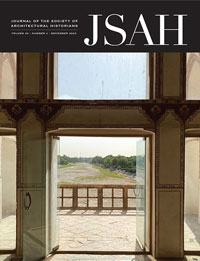May 22, 2013
by
Stephen Fox, Anchorage Foundation of Texas
Houston architect, historian, teacher, art collector, and architectural traveler William F. Stern, 66, died on 1 March 2013, six weeks after he was diagnosed with pancreatic cancer. Bill Stern was a frequent and enthusiastic participant in SAH study tours, even joining a subgroup that went on extra-curricular tours. He had practiced in Houston since 1979 in the firm that, in 1999, became Stern & Bucek Architects. Stern was a prolific winner of design awards from the American Institute of Architects/Houston Chapter and the Texas Society of Architects. He and his partner David Bucek additionally were identified with the preservation of modern buildings following their much-heralded restoration of Philip Johnson’s Menil House of 1951 for the Menil Foundation in 2004.
Stern was born in Cincinnati in 1947. When he was twelve, his parents, Mary S. and Joseph S. Stern, Jr., built a house designed by Cincinnati’s foremost modern architect, Carl A. Strauss. This sparked Stern’s fascination with architecture, which he studied at the Graduate School of Design at Harvard University (MArch, 1973) following his graduation from Harvard College (BA, 1969). Stern first worked for Edward L. Barnes & Associates in New York. Then, in 1976, he struck out for Houston, where he worked for S. I. Morris Associates and for the Houston office of Skidmore, Owings & Merrill before starting his own practice.
Stern gained critical recognition in the early 1980s with a series of townhouse complexes in which he explored ways to claim place and preserve the often-fragile fabric of neighborhoods in un-zoned Houston. Between the 1980s and the 2000s, Stern was a design critic at the University of Houston’s Hines College of Architecture, where he also taught courses on American architectural history. In 2012 he and David Bucek co-taught a preservation studio at the University of Texas at Austin. Stern was a long-time member of the Rice Design Alliance’s program and editorial committees. He served as president of RDA, and, in 1982, was a co-founder of its quarterly publication, Cite: The Architecture and Design Review of Houston. A frequent contributor and guest editor of Cite, Stern was also a co-editor of Ephemeral City: Cite Looks at Houston (2003), a collection of essays from the journal’s first thirty years. Additionally he was a co-founder of Houston Mod, Houston’s modern design preservation group, in 2003.
Stern was an avid and discriminating collector of contemporary art. The house he built for himself in Houston’s Museum District in 1992 was designed for the display of art. Stern served at various times as a trustee of the Museum of Fine Arts, Houston, the Contemporary Arts Museum, and the Blaffer Art Museum of the University of Houston. At the time of his death he served on the collections committee of the Harvard Art Museum and was a trustee of the Menil Foundation. Among his closest friends were the art historian Elizabeth Glassman, the art dealer Fredericka Hunter, and the museum directors Marti Mayo and Linda Shearer. His firm remodeled both the Contemporary Arts Museum and the Blaffer Art Museum. Stern bequeathed his impressive personal collection as well as his house to the Menil Foundation.
Although Stern & Bucek’s work involves a wide array of building types, Stern focused especially on the design of houses. With Bucek and design associate Daniel Hall he concentrated on ensuring that each house was meticulously but simply detailed, whether it contained 2,400 square feet (Salazar House, 2006) or 15,000 square feet (Bleyzer House, 2012). He worked hard to produce designs that were precise, straightforward, and self-effacing.
Bill Stern was contentious. He spoke out for what he believed in, even when this disrupted efforts to build consensus. He was also extraordinarily generous, especially when championing those whom he felt were unfairly overlooked or disadvantaged. When he was away from everyday pressures, as when traveling, Stern was light-hearted and ebullient. He loved architecture and participating in SAH’s architectural tours was a way for him to renew this passion.
A memorial service for Bill Stern was held on Monday, 29 April 2013, at the Menil Collection in Houston. Tributes were delivered by Josef Helfenstein, director of the collection, Elizabeth Glassman, president of the Terra Foundation for American Art, Bruce C. Webb, professor of architecture at the University of Houston, Herman Dyal, Jr., FAIA, graphic designer, and his brother, Peter J. Stern, M.D. The Menil Collection has established the William F. Stern Fund in his memory. Stern also made generous bequests to the Society of Architectural Historians, the Harvard Art Museum and the Gerald D. Hines College of Architecture at the University of Houston.


